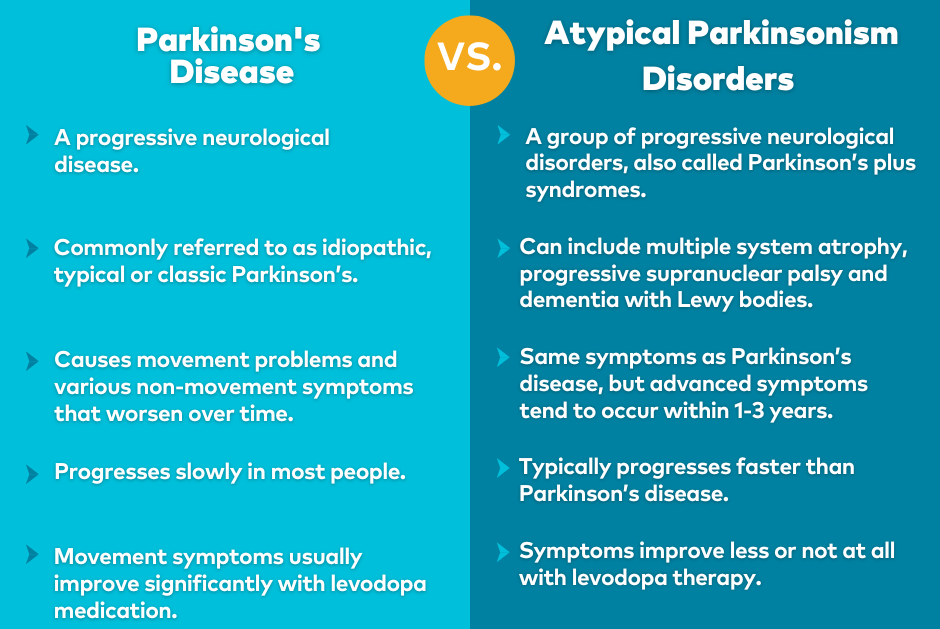Physical Address
304 North Cardinal St.
Dorchester Center, MA 02124

Parkinson’s disease and Huntington’s disease are neurodegenerative disorders that affect different parts of the brain, leading to distinct symptoms and progression.

Credit: www.parkinson.org
Parkinson’s disease and Huntington’s disease are both neurodegenerative disorders that impact the functioning of the central nervous system. While these conditions share some similarities, they also have distinct differences in terms of symptoms, onset, and underlying causes. In this article, we will explore the key differences between Parkinson’s and Huntington’s to gain a better understanding of these complex conditions.
Parkinson’s disease primarily affects movement, leading to symptoms such as tremors, stiffness, and balance issues. These symptoms usually develop gradually and worsen over time. Individuals with Parkinson’s may also experience cognitive impairments, mood changes, and sleep disorders. On the other hand, Huntington’s disease impacts both movement and cognitive function. Early symptoms often include jerky movements, difficulty with coordination, and personality changes.
Parkinson’s disease:
Huntington’s disease:
The underlying causes of Parkinson’s and Huntington’s disease differ significantly. Parkinson’s is primarily caused by the loss of dopamine-producing cells in the brain. The exact reasons for this cell loss are still being explored, but genetic and environmental factors are thought to play a role. In contrast, Huntington’s is a genetic disorder caused by a mutation in the huntingtin gene. This mutation leads to the production of an abnormal protein that damages brain cells, particularly those in the basal ganglia.
| Parkinson’s disease | Huntington’s disease |
|---|---|
| Loss of dopamine-producing cells in the brain | Mutation in the huntingtin gene |
| Genetic and environmental factors may contribute to cell loss |
Production of abnormal protein that damages brain cells |
Understanding the differences between Parkinson’s and Huntington’s disease is crucial for accurate diagnosis and appropriate medical management. While both conditions are progressive in nature, early detection and intervention can help individuals with these diseases maintain a better quality of life.
Parkinson’s Disease and Huntington’s Disease are both neurodegenerative disorders, but they differ in their symptoms and progression. Parkinson’s primarily affects movement, causing tremors and stiffness, while Huntington’s leads to uncontrolled movements, cognitive decline, and psychiatric symptoms.
Parkinson’s disease is a neurodegenerative disorder that primarily affects the motor system. Characterized by the progressive loss of dopamine-producing cells in the brain, Parkinson’s disease leads to a variety of physical and cognitive symptoms.
The most common characteristic of Parkinson’s disease is the presence of tremors. These involuntary shaking movements typically start in one hand and gradually spread to other limbs. Along with tremors, individuals with Parkinson’s may also experience stiffness or rigidity in their muscles, making it difficult for them to initiate and control movement. This can result in a shuffling gait, decreased facial expressions, and poor coordination.
Apart from the motor symptoms, Parkinson’s disease can also manifest with non-motor symptoms. These may include cognitive impairments, such as difficulty with attention, memory, and executive functions. Psychiatric symptoms like depression, anxiety, and sleep disturbances are also common among Parkinson’s patients.
The exact causes of Parkinson’s disease are still not fully understood. However, research suggests that a combination of genetic and environmental factors contribute to its development.
One of the key factors is age, as Parkinson’s disease mostly affects individuals over the age of 50. While the majority of cases are sporadic, meaning they occur randomly, some cases have been linked to specific genetic mutations. Certain genes, such as SNCA and LRRK2, have been associated with an increased risk of developing Parkinson’s disease.
Environmental factors, such as exposure to pesticides and certain toxins, may also play a role. Studies have found associations between occupational exposures, like working in agriculture or industrial settings, and an increased risk of developing Parkinson’s disease.
In conclusion, Parkinson’s disease is a neurodegenerative disorder characterized by motor symptoms, including tremors and muscular rigidity. It may also present with non-motor symptoms, such as cognitive impairments and psychiatric disturbances. While the exact causes are still uncertain, factors like age and genetic mutations, as well as environmental exposures, may contribute to its development.
Parkinson’s Disease and Huntington’s Disease are both neurodegenerative disorders, but they differ in their symptoms and progression. While Parkinson’s primarily affects movement and causes tremors and stiffness, Huntington’s affects both movement and cognitive function, leading to uncontrolled movements and cognitive decline.
Huntington’s Disease is a rare, hereditary neurological disorder that affects approximately 1 in 10,000 people worldwide. It is characterized by a gradual and progressive loss of control over voluntary movements, leading to mobility issues, along with cognitive and psychiatric disturbances. The symptoms usually develop in adulthood, typically between the ages of 30 and 50.
One of the defining characteristics of Huntington’s Disease is chorea, an abnormal, involuntary movement that resembles dance-like jerking. These movements can affect various parts of the body, including the face, arms, and legs. As the disease progresses, chorea can become more severe, making it difficult for individuals to carry out daily activities such as walking, eating, and even speaking.
In addition to chorea, individuals with Huntington’s Disease may also experience a range of other physical and cognitive symptoms. These can include muscle rigidity, difficulty with fine motor skills, poor coordination, and balance problems. Cognitive impairments can manifest as difficulty concentrating, memory loss, and a decline in problem-solving abilities. Individuals may also experience psychological symptoms such as depression, anxiety, and irritability. Communication and swallowing difficulties can also occur as the disease progresses.
Huntington’s Disease is caused by a mutation in the huntingtin gene (HTT). This mutation leads to the production of an abnormal form of the huntingtin protein, which is toxic to brain cells. The gene responsible for Huntington’s Disease is passed down from generation to generation in an autosomal dominant pattern. This means that if a parent carries the mutated gene, there is a 50% chance of each of their children inheriting the disease.
The severity of symptoms and age of onset can vary among individuals with Huntington’s Disease. An individual’s genetic makeup and the length of the repeated DNA sequence within the huntingtin gene can influence the age at which symptoms appear and the progression of the disease. Individuals with a longer repeat length tend to have an earlier onset of symptoms and a more rapid progression of the disease.
In conclusion, Huntington’s Disease is a hereditary condition characterized by chorea, cognitive impairments, and psychiatric symptoms. Understanding the characteristics, symptoms, and genetic factors associated with Huntington’s Disease is essential for early detection, proper management, and support for individuals and their families affected by this debilitating neurological disorder.

Credit: www.cell.com
Parkinson’s disease and Huntington’s disease are both neurological conditions that can cause significant impairment, but they have distinct differences in terms of symptoms, progression, and treatment. Here, we’ll explore the variance in how these two disorders are diagnosed and treated.
Diagnosing Parkinson’s disease and Huntington’s disease involves a combination of clinical assessment, medical history review, and specialized testing. In the case of Parkinson’s, the diagnosis is primarily based on the presence of characteristic motor symptoms such as tremors, bradykinesia, and rigidity. Imaging tests like MRI and CT scans may be used to rule out other conditions. On the other hand, Huntington’s disease diagnosis relies on genetic testing to identify the expansion of the huntingtin gene. This genetic test is definitive and can confirm the presence of the disease even before symptoms appear.
The treatment of Parkinson’s and Huntington’s diseases focuses on managing symptoms and enhancing quality of life. In Parkinson’s disease, medication such as levodopa, dopamine agonists, and MAO-B inhibitors are commonly prescribed to alleviate motor symptoms. For advanced cases, deep brain stimulation (DBS) surgery may be recommended. In contrast, Huntington’s disease has no cure, and the treatment predominantly revolves around symptom management through medications to address movement, emotional, and psychiatric symptoms. Furthermore, speech therapy, physical therapy, and occupational therapy are often utilized to aid in the management of both conditions.
Living with a neurodegenerative disorder such as Parkinson’s or Huntington’s can be challenging. Both conditions can significantly impact the quality of life for individuals and their families. Understanding the differences between Parkinson’s and Huntington’s can help in managing the conditions effectively and utilizing available resources and support.
For individuals living with Parkinson’s, symptoms such as tremors, bradykinesia, and muscle rigidity can be managed through medication, physical therapy, and lifestyle changes. Conversely, individuals with Huntington’s may experience chorea, dystonia, and cognitive decline, which require a tailored approach to symptom management. Both conditions necessitate a holistic care plan that addresses physical, cognitive, and emotional symptoms.
Finding support and resources is essential for individuals impacted by Parkinson’s or Huntington’s. Support groups, caregiver networks, and educational resources can provide invaluable assistance. Additionally, accessing specialized healthcare professionals and participating in clinical trials can offer new treatment options and advancements in research for both conditions.
:max_bytes(150000):strip_icc()/huntingtons-disease-vs-parkinsons-5198690.FINAL-8f5ce2dd05614a349152b8e9b6f970a4.jpg)
Credit: www.verywellhealth.com
Both Parkinson’s and Huntington’s disease are neurodegenerative disorders affecting the nervous system. Parkinson’s primarily affects body movements, causing tremors and stiffness, while Huntington’s disease affects mental and physical abilities, leading to uncontrolled movements and cognitive decline.
Conditions that can be mistaken for Huntington’s include Parkinson’s disease, essential tremor, dementia, and certain mental health disorders.
The life expectancy of someone with Huntington’s disease is typically 10 to 30 years after symptoms begin. This can vary depending on the individual’s overall health and the progression of the disease. Treatment and care can also impact life expectancy.
MS is a disorder that affects the brain and spinal cord, causing vision, balance, and movement problems. Huntington’s disease is a genetic disorder that causes the degeneration of nerve cells in the brain, leading to movement, cognitive, and psychiatric issues.
To summarize, Parkinson’s and Huntington’s are both neurological disorders that affect movement, but they differ in many ways. Parkinson’s primarily causes tremors, stiffness, and slow movement, while Huntington’s results in uncontrolled movements, cognitive decline, and emotional disturbances. Understanding the differences between these two conditions is crucial for accurate diagnosis and appropriate treatment.
By raising awareness and promoting research, we can improve the lives of those affected by these challenging illnesses.

